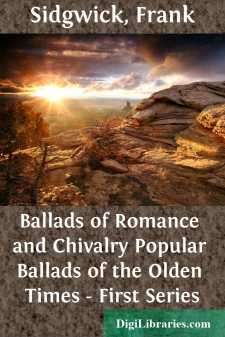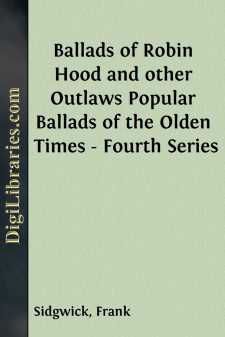Categories
- Antiques & Collectibles 13
- Architecture 36
- Art 48
- Bibles 22
- Biography & Autobiography 813
- Body, Mind & Spirit 142
- Business & Economics 28
- Children's Books 15
- Children's Fiction 12
- Computers 4
- Cooking 94
- Crafts & Hobbies 4
- Drama 346
- Education 46
- Family & Relationships 57
- Fiction 11829
- Games 19
- Gardening 17
- Health & Fitness 34
- History 1377
- House & Home 1
- Humor 147
- Juvenile Fiction 1873
- Juvenile Nonfiction 202
- Language Arts & Disciplines 88
- Law 16
- Literary Collections 686
- Literary Criticism 179
- Mathematics 13
- Medical 41
- Music 40
- Nature 179
- Non-Classifiable 1768
- Performing Arts 7
- Periodicals 1453
- Philosophy 64
- Photography 2
- Poetry 896
- Political Science 203
- Psychology 42
- Reference 154
- Religion 513
- Science 126
- Self-Help 84
- Social Science 81
- Sports & Recreation 34
- Study Aids 3
- Technology & Engineering 59
- Transportation 23
- Travel 463
- True Crime 29
Ballads of Romance and Chivalry Popular Ballads of the Olden Times - First Series
by: Frank Sidgwick
Categories:
Description:
Excerpt
PREFACE
Of making selections of ballads there is no end. As a subject for the editor, they seem to be only less popular than Shakespeare, and every year sees a fresh output. But of late there has sprung up a custom of confusing the old with the new, the genuine with the imitation; and the products of civilised days, ‘ballads’ by courtesy or convention, are set beside the rugged and hard-featured aborigines of the tribe, just as the delicate bust of Clytie in the British Museum has for next neighbour the rude and bold ‘Unknown Barbarian Captive.’ To contrast by such enforced juxtaposition a ballad of the golden world with a ballad by Mr. Kipling is unfair to either, each being excellent in its way; and the collocation of Edward or Lord Randal with a ballad of Rossetti’s is only of interest or value as exhibiting the perennial charm of the refrain.
There exist, however, in our tongue—though not only in our tongue—narratives in rhyme which have been handed down in oral tradition from father to son for so many ages, that all record of their authorship has long been lost. These are commonly called the Old Ballads. Being traditional, each ballad may exist in more than one form; in most cases the original story is clothed in several different forms. The present series is designed to include all the best of these ballads which are still extant in England and Scotland: Ireland and Wales possess a similar class of popular literature, but each in its own tongue. It is therefore necessary, in issuing this the first volume of the series, to say somewhat as to the methods employed in editing and selecting.
Ballad editors of yore were confronted with perhaps two, perhaps twenty, versions of each ballad; some unintelligibly fragmentary, some intelligibly complete; some in print, some in manuscript, some, perchance, in their own memories. Collating these, they subjected the text to minute revision, omitting and adding, altering and inserting, to suit their personal tastes and standards, literary or polite; and having thus made it over, forgot to record the act, and saw no reason to apologise therefor.
Pioneers like Thomas Percy, Bishop of Dromore, and Sir Walter Scott, may well be excused the general censure. The former, living in and pandering to an age which invented and applied those delightful literary adjectives ‘elegant’ and ‘ingenious,’ may be pardoned with the more sincerity if one recalls the influence exercised on English letters by his publication. The latter, who played the part of Percy in the matter of Scottish ballads, and was nourished from his boyhood on the Reliques, printed for the first time many ballads which still are the best of their class, and was gifted with consummate skill and taste. Both, moreover, did their work scientifically, according to their lights; and both have left at least some of their originals behind them. There is, perhaps, one more exception to the general condemnation. Of William Allingham’s Ballad Book, as truly a vade mecum as Palgrave’s lyrical anthology in the same ‘Golden Treasury’ series, I would speak, perhaps only for sentimental reasons, always with respect, admiring the results of his editing while looking askance at the method, for he mixed his ingredients and left no recipe....



